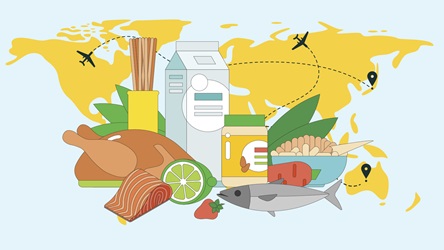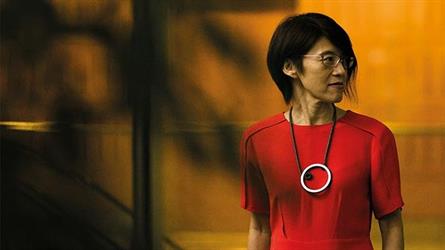Why Soft Power Suits Singapore

1945. The Second World War was over. But the battle for supremacy continued. With Europe’s economy in tatters, the US feared Soviet communism would creep in and cement a deep ideological hold over the continent.
In response, they came up with the European Recovery Programme – a US-sponsored aid initiative often referred to as The Marshall Plan, after the then US Secretary of State George C. Marshall. Under the programme, Europe received humanitarian aid, various grants and consultation on rebuilding devastated infrastructure.
The then British Prime Minister Winston Churchill referred to it as “the most unselfish act by any great power in history”. Others, though, decried the plan, claiming the Americans’ actions were forms of economic imperialism and political control, not altruism.
Good intentions or not, the Marshall Plan is a classic example of “soft power”, a concept coined in 1990 by former US Assistant Secretary of Defense for International Security Affairs and Harvard professor Joseph Nye.
The Need For Soft Solutions
Soft power, according to Prof Nye, refers to a nation’s ability to persuade other nations to agree with it or to desire the outcomes it wants. Rather than resort to hard power (military attacks or economic sanctions, for instance), countries rely on the attractiveness of their cultural influences and diplomatic moves to gain support and favour on the international stage.
“Think of the end of the Cold War. Not a single shot was fired,” Prof Nye told German magazine Das Spiegel. “For decades, the American military was necessary to deter Soviet aggression and expansion. But it was mainly the soft power elements which penetrated the Iron Curtain and made the people on the other side lose faith.”
Today, governments other than the US are looking to soft power to reduce tensions and increase their global clout, political or otherwise.
South Korea is a good example. The country has successfully used “Hallyu” diplomacy, or South Korean pop culture, to win fans abroad. Indeed its president Park Geun-hye affirmed the importance of soft power earlier this year, when she declared in her inauguration speech: “In the 21st century, culture is power… We will harness the innate value of culture in order to heal social conflicts and [bridge] cultural divides separating different regions, generations and social strata.”
Soft power is crucial for Singapore too. Associate Professor Alan Chong at the S. Rajaratnam School of International Studies explained: “Soft power suits Singapore in a fluid post-Cold War, post-September 11 environment where information travels freely everywhere and instances of physical aggression become widely amplified for public opinion to react to.”

Also, when tension arises between Singapore and other countries, the effectiveness of hard power in resolving conflicts may be limited. “Economic capacity and the mutual exchange of interest in terms of economic cooperation do not really buffer Singapore when something like the Flor Contemplacion incident occurs, or if foreign politicians try to whip up unpopular sentiment against Singapore,” said Dr Chong Ja Ian from the Department of Political Science at the National University of Singapore (NUS).
In 1995, the Singapore courts sentenced Filipina domestic worker Contemplacion to death for the murder of another domestic worker and the young son of the latter’s employer. Despite a personal plea from the then Philippines president to stop the execution, the sentence was carried out. Singapore was heavily criticised by the Philippines for meting out the harsh punishment.

The Race To Power up
While Singapore has always been known for being uncompromising in enforcing its laws, it has also shown the world its softer side through humanitarian efforts, such as its peacekeeping missions overseas.
Dr Chong from NUS believes such missions are helpful in three ways. They create a positive image of Singapore among the local population where the peacekeepers serve, demonstrate that Singapore shoulders its international responsibilities, and reinforce existing military-to-military cooperation with friendly countries. “The same can be said of disaster relief missions, such as what our armed forces did in Aceh,” he said.
But Singapore needs to sharpen its soft power tools, if its rankings on the annual Monocle (a UK-based magazine) survey in recent years are anything to go by. The survey rates countries according to their influence in global politics, diplomacy, business, culture, sports and education.
From a 13th place showing in 2010 (thanks to the city-state’s investment in creative industries, Channel News Asia and Singapore Airlines), it slipped to the 22nd spot in 2011. The reason – there’s still “confusion over what and where Singapore is”. Singapore then continued its decline to number 26 in 2012.
In the same survey, the UK came out tops. According to Monocle, winning major international sports competitions, such as the Tour de France and Wimbledon, was an important reason behind the UK’s victory on the soft power chart.
Sports has always played a critical role in society by building a sense of cohesion and unifying people across different demographics, said Nominated Member of Parliament and Executive Director of the Singapore Institute of International Affairs Nicholas Fang. In other words, sports has the ability to capture and bind hearts, even beyond country boundaries. Think of the football teams in the English Premier League and their scores of loyal fans worldwide.
Monocle also attributed the UK’s top spot to its hosting of the London Olympic Games. The ability to take charge of mammoth events like the Olympics shows the world that the country is a major power, explained Mr Fang.
By comparison, Singapore still has some way to go in using sporting success and events to wield soft power. Mr Fang said that Singapore’s sporting development has lagged behind that of major global powers, largely because of its small size and priorities, which have focused more on education and the economy, rather than sports.
However, he pointed to other areas Singapore can work on: “The country has sought to be a player in the international sporting arena by hosting major sports events such as the Formula 1 race, [which is] still the only full night race on the F1 calendar.
“The new Sports Hub being built will also be a major landmark for the country, and will enable other significant sporting events to be held in Singapore.”
These, he believes, will help in the branding of Singapore abroad and boost the country’s soft power.
Let’s Get Friendlier
If Singapore wants a more positive international image, it needs to let its hair down, suggested Monocle. It criticised Singapore for being a nanny state, highlighting the recent censorship woes faced by Singaporean film maker Ken Kwek for his satirical comedy film Sex.Violence.FamilyValues.
But not all is bleak and gloomy – the magazine praised Singapore for promoting the arts by investing in new museums, exhibition venues like Gillman Barracks and art schools.
Dr Chong believes greater efforts towards winning the hearts of ordinary people from countries nearby can also help to boost the nation’s global influence.
Such efforts do not have to be expensive or large-scale. “It can be sending students and young people to various places to learn alongside students from neighbouring countries, to teach, to provide basic hygiene and preventative healthcare, to help build local facilities like houses and drains.
“This puts a human face to Singapore [for] our neighbours. It shows that Singapore is not just about infrastructure projects or big money,” he explained.
The youth corps initiative announced by Prime Minister Lee Hsien Loong at the National Day Rally, for instance, is a step in the right direction, said Assoc Prof Chong. The National Youth Council aims to reach out to 6,000 youth volunteers every year to participate in overseas and local community projects.
On the business front, helping local companies to gain a stronger presence in emerging markets such as Yangon, Johannesburg and Istanbul would also enhance Singapore’s international appeal, said Mr Teo Eng Cheong, Chief Executive Officer of International Enterprise (IE) Singapore.
“It is important that as our companies invest overseas, they operate as good coporate citizens and contribute to the wellbeing and development of the emerging markets. In this way, we will be able to sustain and strengthen our reputation in these markets.”

Smart Power
Soft power may have many advantages, but this doesn’t mean hard power – military and economic might – has become obsolete. Sending youths to neighbouring countries requires economic resources. Peacekeeping missions are only possible because there’s a military force in the first place.
Speaking at a Council on Foreign Affairs event on the eve of her last day as US Secretary of State, Hillary Clinton remarked how the US needs to respond to a new world. “We need a new architecture for a new world… Where once a few strong columns could hold up the weight of the world, today we need a dynamic mix of materials and structures.”

That dynamic mix is encapsulated by the term “smart power”, which was coined by Prof Nye in 2003. It means utilising both soft power and hard power.
In a Foreign Affairs magazine article, Prof Nye wrote: “If a state can set the agenda for others or shape their preferences, it can save a lot on carrots and sticks. But rarely can it totally replace either. Thus the need for smart strategies that combine the tools of both hard and soft power.”
The challenge for governments now is to get the right mix of smart power to pack enough punch in their foreign policies – and win hearts at the same time.

Every year, some 4,000 foreigners pass through the doors of Civil Service College (CSC) International, a learning centre for those impressed by Singapore’s success and who are keen to study the country’s public sector policies, reforms and management practices.
The college attracts participants who are potential leaders or even the leaders themselves. The idea is that by making Singapore and its policies familiar and likeable to these participants, they in turn may become more favourable to Singapore and its policies.
“But it’s not just for that purpose. If we prosper and our neighbours are in dire straits, we are not going to attract investments to Singapore as well. So it’s really a prosper-thy-neighbour kind of philosophy,” said CSC International Director Tina Ng.
Also, when ties between Singapore and other countries are strong, cooperation can still continue “even if at the political level there is a short-term fallout,” said Ms Ng. Indeed, Singapore has had ssues with its neighbours – most recently with Indonesia on the smog. Yet, none of these have strained bilateral ties to irreversible levels.

The Singapore Cooperation Enterprise (SCE), a subsidiary of IE Singapore, also shares this country’s public sector expertise with foreign government officials through training, consultancy and working on actual projects.
According to Mr Teo, IE Singapore’s Chief Executive Officer, those who worked with SCE “have generally become even more impressed by, and fond of, Singapore. This has further enhanced Singapore’s global image.”
The building of strong relationships through training programmes will also benefit Singapore businesses. “When Singapore companies go to China, they will have a better reputation with the government there. There could be enhanced economic collaboration or spin-offs,” said CSC International Deputy Director Wong Wai Cheng.
As crucial as it is to reach out to foreign diplomats, Dr Chong said exchanges with foreign students are just as, if not more, important. “Scholars, artists and students interact more broadly with their home populations and also write and produce work for public consumption.”
Talented foreign students can go for the Singapore Scholarship that is fully sponsored by the Singapore Cooperation Programme, established in 1992 to offer assistance to other countries. Students from Association of South East Asian Nations states who manage to get the Singapore Scholarship do not have to serve a bond. They are expected to return to their country and contribute to development there instead.
Many critics would rather see more resources spent on Singaporean students instead. However, such scholarships could benefit bilateral relations between Singapore and the scholars’ countries.
Students may end up in official positions or in important businesses, and they may look favourably towards Singapore as a place that provided opportunities for them – opportunities which they probably would not have received in their own countries.
“China is very aggressive in this area [of using education for soft power gains]. It provides scholarships and training to many African students with a long-term view,” said Ms Ng. Africa has recently become one of the most important investment markets for China.
As the competition for global influence heats up, Singapore needs to keep itself on its toes or risk losing its edge.
- POSTED ON
Nov 28, 2013
-
Deep Dive
Strengthening Singapore’s Food Security
-
Feature
Why DBS Wants To Be Gandalf
-
Profile
Tales Of Malay Past









